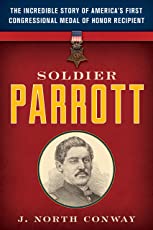Book Review: Soldier Parrott
Soldier Parrott: The Incredible Story of America’s First Congressional Medal of Honor Recipient
By J. North Conway
Lyons Press, 2021
$28.95 hardcover
Reviewed by David T. Dixon
The daring theft of a locomotive on the Western and Atlantic Railroad in northern Georgia by a party Union soldiers led by spy James J. Andrews is one of the most dramatic episodes of the American Civil War. On April 12, 1862, nineteen men disguised as southern civilians commandeered an engine named the General and sped away. For more than thirty miles, they cut telegraph lines, tore up track, and uncoupled boxcars in a race to Chattanooga, Tennessee, where they had hoped to slip back behind enemy lines. They never made it. All were captured in the woods near Ringgold, Georgia, after abandoning the purloined engine. Andrews and seven others were hanged as spies. A few eventually escaped, but most survivors spent months in various rebel prisons.
This tale has been told dozens of times by historians, popular writers, and the participants themselves, beginning as early as 1863. Buster Keaton’s 1926 silent film The General and Walt Disney’s 1956 production The Great Locomotive Chase entertained thousands with pop culture versions of the story.
Eighteen-year-old Ohio farm boy and volunteer US soldier Jacob Parrott was one of the lucky survivors. He and most of his fellow raiders were awarded the newly established Congressional Medal of Honor in March 1863 for their valor during the hazardous mission. Conway’s book purports to be a biography of Parrott set in the context of a history of the famous raid.
Author J. North Conway of Massachusetts has published sixteen previous books through independent presses on topics including geology, maritime disasters, and even a cookbook. His Gilded Age crime trilogy was panned by numerous reviewers as an unsuccessful attempt to mimic the success of heralded nonfiction writers like Erik Larson (The Devil in the White City) and Karen Abbott (Liar, Temptress, Soldier, Spy). In this newest book, Conway chose to invent scenes and dialogue out of whole cloth, despite the publisher’s dubious claim that he “brings a new level of research and personal grit to Civil War history.”
There are many problems with this book. In a curious introduction, Conway explains: “I wrote this book about Jacob Parrott because it is a good story. I like good stories. I also wrote it because it is something my father would have liked. He liked everything about the military and was an avid reader of history and military history books.” Readers realize early on that Conway’s story is neither history nor biography.
Conway’s insurmountable task was his attempt to write a biography of Parrott. Most obscure volunteer soldiers left scant paper trails. Parrott was illiterate, so there are no letters home or contemporary newspaper accounts where the subject speaks to us in his own words. When he did finally relate some facts about his wild adventure to McClure’s magazine in 1903, more than forty years after the raid, an Ohio attorney and ghostwriter penned it for him. In the absence of primary source evidence, Conway fabricates scenes that do not even comport with Parrott’s decades-old recollections. Trite characters abound in the author’s attempt to add drama and interest to an incredible true story that needs no such embellishment. In one section, a grisly, profane slave hunter shelters Parrott and his companion while absurdly stabbing a copy of Uncle Tom’s Cabin with his knife. Conway titles another subsection “That Midnight Train to Georgia” in a goofy, irrelevant homage to the famous song by Gladys Knight and the Pips. It does not get better from there.
What to make of Soldier Parrott? One might be tempted to call it historical fiction masquerading as history. But even properly represented as a fictional account based on a real event, the book fails on so many levels. Conway interrupts his story midstream numerous times throughout the book to introduce fanciful characters. He attempts to interject historical context via stilted, stand-alone sections, rather than weaving that background into his narrative. Suffice it to say that Conway’s writing does not belong in the same conversation with historical fiction classics like Stephen Crane’s Red Badge of Courage, Charles Frazier’s Cold Mountain, and Michael Shaara’s The Killer Angels.
Furthermore, an accurate and comprehensive treatment of this famous raid augmented by clear analysis and dramatic prose was already published by Russell Bonds in his award-winning Stealing the General: The Great Locomotive Chase and the First Medal of Honor (Westholme Publishing, 2007). Readers wishing to learn the authentic history of the Andrews Raid would be much better served by perusing Bonds’ fine effort.
————
David T. Dixon is the author of Radical Warrior: August Willich’s Journey from German Revolutionary to Union General (Univ. of Tennessee Press, 2020).

As the director of the Hardin County Historical Museums, located in Kenton, Ohio, the home of Jacob Parrott, I find books like this disheartening. The correct information about Parrott is available if one is willing to put in the research. If readers are looking for a thorough biography about Jacob Parrott I would highly recommend Charles Jacobs’s book Bravest of the Brave. And if you are ever in Kenton, Ohio, stop in to the museum and see artifacts including Parrott’s Medal of Honor.
Naw soldier parrot is entertaining and enlightening certainly not written by some mummified academic